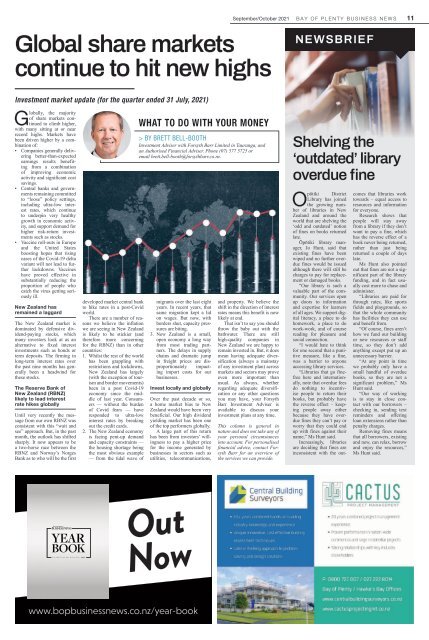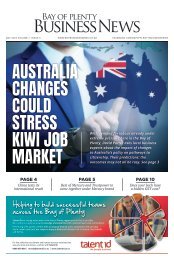September/October 2021 - Bay of Plenty Business News
From mid-2016 Bay of Plenty businesses have a new voice, Bay of Plenty Business News. This new publication reflects the region’s growth and importance as part of the wider central North Island economy.
From mid-2016 Bay of Plenty businesses have a new voice, Bay of Plenty Business News. This new publication reflects the region’s growth and importance as part of the wider central North Island economy.
Create successful ePaper yourself
Turn your PDF publications into a flip-book with our unique Google optimized e-Paper software.
<strong>September</strong>/<strong>October</strong> <strong>2021</strong> BAY OF PLENTY BUSINESS NEWS 11<br />
Global share markets<br />
continue to hit new highs<br />
NEWSBRIEF<br />
Investment market update (for the quarter ended 31 July, <strong>2021</strong>)<br />
Globally, the majority<br />
<strong>of</strong> share markets continued<br />
to climb higher,<br />
with many sitting at or near<br />
record highs. Markets have<br />
been driven higher by a combination<br />
<strong>of</strong>:<br />
• Companies generally delivering<br />
better-than-expected<br />
earnings results benefiting<br />
from a combination<br />
<strong>of</strong> improving economic<br />
activity and significant cost<br />
savings.<br />
• Central banks and governments<br />
remaining committed<br />
to “loose” policy settings,<br />
including ultra-low interest<br />
rates, which continue<br />
to underpin very healthy<br />
growth in economic activity,<br />
and support demand for<br />
higher risk-return investments<br />
such as stocks.<br />
• Vaccine roll-outs in Europe<br />
and the United States<br />
boosting hopes that rising<br />
cases <strong>of</strong> the Covid-19 delta<br />
variant will not lead to further<br />
lockdowns. Vaccines<br />
have proved effective in<br />
substantially reducing the<br />
proportion <strong>of</strong> people who<br />
catch the virus getting seriously<br />
ill.<br />
New Zealand has<br />
remained a laggard<br />
The New Zealand market is<br />
dominated by defensive dividend-paying<br />
stocks, which<br />
many investors look at as an<br />
alternative to fixed interest<br />
investments such as bonds or<br />
term deposits. The firming in<br />
long-term interest rates over<br />
the past nine months has generally<br />
been a headwind for<br />
these stocks.<br />
The Reserve Bank <strong>of</strong><br />
New Zealand (RBNZ)<br />
likely to lead interest<br />
rate hikes globally<br />
Until very recently the message<br />
from our own RBNZ was<br />
consistent with this “wait and<br />
see” approach. But, in the past<br />
month, the outlook has shifted<br />
sharply. It now appears to be<br />
a two-horse race between the<br />
RBNZ and Norway’s Norges<br />
Bank as to who will be the first<br />
developed market central bank<br />
to hike rates in a post-Covid<br />
world.<br />
There are a number <strong>of</strong> reasons<br />
we believe the inflation<br />
we are seeing in New Zealand<br />
is likely to be stickier (and<br />
therefore more concerning<br />
for the RBNZ) than in other<br />
countries:<br />
1. Whilst the rest <strong>of</strong> the world<br />
has been grappling with<br />
restrictions and lockdowns,<br />
New Zealand has largely<br />
(with the exception <strong>of</strong> tourism<br />
and border movements)<br />
been in a post Covid-19<br />
economy since the middle<br />
<strong>of</strong> last year. Consumers<br />
— without the burden<br />
<strong>of</strong> Covid fears — have<br />
responded to ultra-low<br />
interest rates by breaking<br />
out the credit cards.<br />
2. The New Zealand economy<br />
is facing pent-up demand<br />
and capacity constraints —<br />
the housing shortage being<br />
the most obvious example<br />
— from the tidal wave <strong>of</strong><br />
WHAT TO DO WITH YOUR MONEY<br />
> BY BRETT BELL-BOOTH<br />
Investment Adviser with Forsyth Barr Limited in Tauranga, and<br />
an Authorised Financial Adviser. Phone (07) 577 5725 or<br />
email brett.bell-booth@forsythbarr.co.nz.<br />
migrants over the last eight<br />
years. In recent years, that<br />
same migration kept a lid<br />
on wages. But now, with<br />
borders shut, capacity pressures<br />
are biting.<br />
3. New Zealand is a small,<br />
open economy a long way<br />
from most trading partners.<br />
The delays in supply<br />
chains and dramatic jump<br />
in freight prices are disproportionately<br />
impacting<br />
import costs for our<br />
businesses.<br />
Invest locally and globally<br />
Over the past decade or so,<br />
a home market bias to New<br />
Zealand would have been very<br />
beneficial. Our high dividend<br />
yielding market has been one<br />
<strong>of</strong> the top performers globally.<br />
A large part <strong>of</strong> this return<br />
has been from investors’ willingness<br />
to pay a higher price<br />
for the income generated by<br />
businesses in sectors such as<br />
utilities, telecommunications,<br />
and property. We believe the<br />
shift in the direction <strong>of</strong> interest<br />
rates means this benefit is now<br />
likely at end.<br />
That isn’t to say you should<br />
throw the baby out with the<br />
bathwater. There are still<br />
high-quality companies in<br />
New Zealand we are happy to<br />
remain invested in. But, it does<br />
mean having adequate diversification<br />
(always a mainstay<br />
<strong>of</strong> any investment plan) across<br />
markets and sectors may prove<br />
even more important than<br />
usual. As always, whether<br />
regarding adequate diversification<br />
or any other questions<br />
you may have, your Forsyth<br />
Barr Investment Adviser is<br />
available to discuss your<br />
investment plans at any time.<br />
This column is general in<br />
nature and does not take any <strong>of</strong><br />
your personal circumstances<br />
into account. For personalised<br />
financial advice, contact Forsyth<br />
Barr for an overview <strong>of</strong><br />
the services we can provide.<br />
Shelving the<br />
‘outdated’ library<br />
overdue fine<br />
Opōtiki District<br />
Library has joined<br />
the growing number<br />
<strong>of</strong> libraries in New<br />
Zealand and around the<br />
world that are shelving the<br />
‘odd and outdated’ notion<br />
<strong>of</strong> fines on books returned<br />
late.<br />
Ōpōtiki library manager,<br />
Jo Hunt, said that<br />
existing fines have been<br />
wiped and no further overdue<br />
fines would be issued<br />
although there will still be<br />
charges to pay for replacement<br />
or damaged books.<br />
“Our library is such a<br />
valuable part <strong>of</strong> the community.<br />
Our services open<br />
up doors to information<br />
and expertise for learners<br />
<strong>of</strong> all ages. We support digital<br />
literacy, a place to do<br />
homework, a place to do<br />
work-work, and <strong>of</strong> course<br />
reading for pleasure and<br />
social connection.<br />
“I would hate to think<br />
for one second that a punitive<br />
measure, like a fine,<br />
was a barrier to anyone<br />
accessing library services.<br />
“Libraries that go finefree<br />
here and internationally,<br />
note that overdue fees<br />
do nothing to incentivise<br />
people to return their<br />
books, but probably have<br />
the reverse effect – keeping<br />
people away either<br />
because they have overdue<br />
fines they can’t pay or<br />
worry that they could end<br />
up with fines against their<br />
name,” Ms Hunt said.<br />
Increasingly, libraries<br />
are deciding that fines are<br />
inconsistent with the outcomes<br />
that libraries work<br />
towards – equal access to<br />
resources and information<br />
for everyone.<br />
Research shows that<br />
people will stay away<br />
from a library if they don’t<br />
want to pay a fine, which<br />
has the reverse effect <strong>of</strong> a<br />
book never being returned,<br />
rather than just being<br />
returned a couple <strong>of</strong> days<br />
late.<br />
Ms Hunt also pointed<br />
out that fines are not a significant<br />
part <strong>of</strong> the library<br />
funding, and in fact usually<br />
cost more to chase and<br />
administer.<br />
“Libraries are paid for<br />
through rates, like sports<br />
fields and playgrounds, so<br />
that the whole community<br />
has facilities they can use<br />
and benefit from.<br />
“Of course, fines aren’t<br />
how we fund our building<br />
or new resources or staff<br />
time, so they don’t add<br />
anything except put up an<br />
unnecessary barrier.<br />
“At any point in time<br />
we probably only have a<br />
small handful <strong>of</strong> overdue<br />
books, so they are not a<br />
significant problem,” Ms<br />
Hunt said.<br />
“Our way <strong>of</strong> working<br />
is to stay in close contact<br />
with our borrowers –<br />
checking in, sending text<br />
reminders and <strong>of</strong>fering<br />
loan extensions rather than<br />
penalty charges.<br />
Removing fines means<br />
that all borrowers, existing<br />
and new, can relax, borrow<br />
and enjoy the resources,”<br />
Ms Hunt said.<br />
YEAR<br />
BOOK<br />
CELEBRATING BAY BUSINESS | <strong>2021</strong><br />
Out<br />
Now<br />
www.bopbusinessnews.co.nz/year-book

















